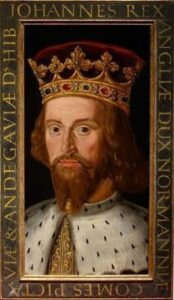Written by Victora Howell
The King of the Robin Hood Ballads
Actually, King or Prince John never appears in the original Robin Hood ballads! There the king is named as ‘Edward’, though which one is never made clear, and Robin Hood is on his side. Scholars usually attribute the setting of the ballads to the 13th or 14th centuries, but it is widely accepted that they may not be historically accurate!
The character of King/Prince John is a late addition to the Robin Hood myth, first appearing in Howard Pyle’s 1883 novel ‘The Merry Adventures of Robin Hood’ – which was itself heavily influenced by Sir Walter Scott’s ‘Ivanhoe’ – and this is where the idea of setting Robin Hood and Prince John up as enemies is first introduced. Pyle’s novel is written for children and collates the original ballads into an episodic narrative, but although King John is depicted, Robin does not stand up against him. It is Pyle’s novel which also establishes Robin as the now familiar philanthropist outlaw robbing from the rich to give to the poor whereas for the previous four centuries, in the ballads, he had been simply a crook out for personal gain.
The King of TV and Film
Much of what we now recognise as the legend of Robin Hood comes from the films and tv series of the 20th century – which themselves drew on Scott and Pyle’s interpretations. And perhaps the most enduring image of Prince John comes from Disney’s 1973 animated film ‘Robin Hood’. Depicted as a lion and voiced by Peter Ustinov, this Prince John is placed firmly in the middle of the action as the main antagonist.
But this has not been the case with most portrayals. Prince John has been portrayed in several versions – most notably by Claude Rains in the triple Oscar winning 1938 film ‘The Adventures of Robin Hood’ – but his role in the story tends to be overshadowed by the more villainous Sheriff of Nottingham. From Ian Holm in ‘Robin and Marian’ (1976) to Phil Davis in ‘Robin of Sherwood’ (TV 1984-86) to Oscar Isaac in ‘Robin Hood’ (2010), King John is very much second fiddle to the Sheriff. In fact, in the latest film version, ‘Robin Hood’ (2018), as well as in arguably the most famous recent version ‘Robin Hood: Prince of Thieves’ (1991) poor old John is dispensed with altogether, leaving the villainy entirely to the Sheriff and his henchman Guy of Gisbourne.
The only other versions, apart from Disney’s, to bring Prince/King John to the fore are spoofs. Children’s TV series ‘Maid Marian and her Merry Men’ (1989-1994) and comedy film ‘Robin Hood: Men in Tights’ (1993).
So perhaps it’s not surprising that our main memory of him is as a thumb-sucking cowardly lion…!

King John of England
Of course, unlike many of the Robin Hood characters, King John was also a real person. Ruling England from 1199 to 1216 he was described as a “tyrant rather than a king”. As the youngest of four sons, he was never expected to inherit the Crown and when he did take power he wasn’t very good at being king. He managed to lose the Angevin-Plantagenet lands in France, cripple England financially and upset the Barons so much with his taxation strategy that they made him sign the Magna Carta effectively limiting the power of the monarchy and placing it under the rule of law for the first time.

Not that this bothered John too much, as a month later he got the pope to annul the document and Magna Carta didn’t become finalised until 1297 in a much revised form.
Although today, historians generally regard King John as a hardworking administrator, an able man and an able general, he is also described as having distasteful, even dangerous personality traits such as spitefulness, pettiness and cruelty. In response to a nobleman’s debt, for example, he imprisoned the man’s wife and son, with the result that they both died in prison. He ruled by fear, demanded debilitating taxes to fund his campaigns in France and, over time, his reign came to epitomise oppression and tyranny.
No wonder Walter Scott found him such a fitting enemy for Robin Hood!
King John in the World of HOOD
In most iterations of the Robin Hood legend, this character is known as Prince John – he is a Prince Regent, keeping the throne warm for his brother’s return. In our version, however, he has already seized power. With King Richard missing presumed dead for five years in the Promised Land campaign, his successor should have been his niece Marian, but she stepped aside in favour of her uncle John.
Now crowned, King John Fitzwalter echoes his real world namesake by initiating unpopular policies. With the Queendom of East Mercia suffering devastating food shortages as a result of advanced climate change, Fitzwalter has made the practical but brutal decision that not everyone can survive. With a keen interest in science, he has taken a mathematical approach to the problem and worked out how many he can save. Turns out, those he can save are the richest in society and so, to help protect them, he has constructed a wall around the centre of the city, creating an Inner Circle of the rich, outside, in the Outer Circle, the poor survive as best they can.
And Fitzwalter sees no problem with this solution. Always more comfortable with facts and figures than with people, he follows the science and this is the way it leads. To him it makes perfect sense – he is acting for the greater good: this way at least some of his subjects will survive. It’s essentially the Trolley Problem writ large!
But, again like his real world namesake, King John faces a huge backlash from his people. In an attempt to control the inevitable uprising, he employs the full scope of his Sheriff’s security forces, bringing in draconian new laws with harsh penalties for transgressors. Which of course just makes him more unpopular!
Ultimately, John Fitzwalter is a fitting adversary for Robyn. His ideology is directly opposite to hers; he is logic, she is passion. And although the Sheriff is Robin Hood’s more traditional enemy, in our version she is Robyn’s sister and there is a degree of restraint that comes with that. Not so for Fitzwalter. Although there is a history between him and Robyn, he will stop at nothing to ensure she stays out of his way. Read more about him on his wiki page.
Sound Off
Do you agree with Fitzwalter? Is it ok to let a few die so the rest can survive? How would you solve East Mercia’s food crisis?

